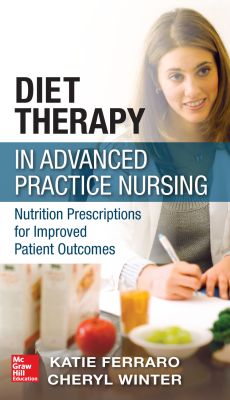Diet Therapy in Advanced Practice Nursing
Step 1. Download Adobe Digital Editions Both PC and Mac users will need to download Adobe Digital Editions to access their eBook. You can download Adobe Digital Editions at Adobe's website here.
Step 2. Register an Adobe ID if you do not already have one. (This step is optional, but allows you to open the file on multiple devices) Visit account.Adobe.com to register your Adobe account.
Step 3: Authorize Adobe Digital Editions using your Adobe ID. In Adobe Digital Editions, go to the Help menu. Choose “Authorize Computer.”
Step 4: Open your file with Adobe Digital Editions. Once you’ve linked your Adobe Digital Editions with your Adobe ID, you should be able to access your eBook on any device which supports Adobe Digital Editions and is authorized with your ID. If your eBook does not open in Adobe Digital Editions upon download, please contact customer service
As scientific evidence continues to emerge showing the underlying role nutrition and diet play in preventing and treating common health issues such as cardiovascular disease, diabetes, and cancer, there's renewed emphasis by healthcare providers on delivering individualized nutrition prescriptions to patients to improve health outcomes. While this role has traditionally been performed in out-patient and in-patient settings by registered dieticians, advanced practice nurses now play a major role in giving diet and nutrition advice to patients and, in some cases, prescribing medical and diet therapy plans.
Diet Therapy in Advanced Practice Nursing gathers together the evidence-based guidelines and practices recommended for the prevention, management, and treatment of a variety of disease states. Co-authors Katie Ferraro, RD, and Cheryl Winter, RD, NP, used their combined knowledge and experience in nutrition and nursing practice to write an easy-to-use book that gives readers practical resources such as:
- Meal planning and tracking tools
- Nutrition screening, assessment, and counseling techniques
- Body weight regulation principles
- Nutrition assessment and monitoring parameters
Individual chapters cover nutrition for all major disease states, giving prevention guidelines, medical nutrition and diet therapy recommendations, patient education tools, and detailed complication and side effect considerations. The book concludes with appendices containing key information for clinical reference, including Dietary Reference Intake (DRI) tables, USDA Food Patterns, CDC Growth Charts, and Useful Conversions for Nutrition.

